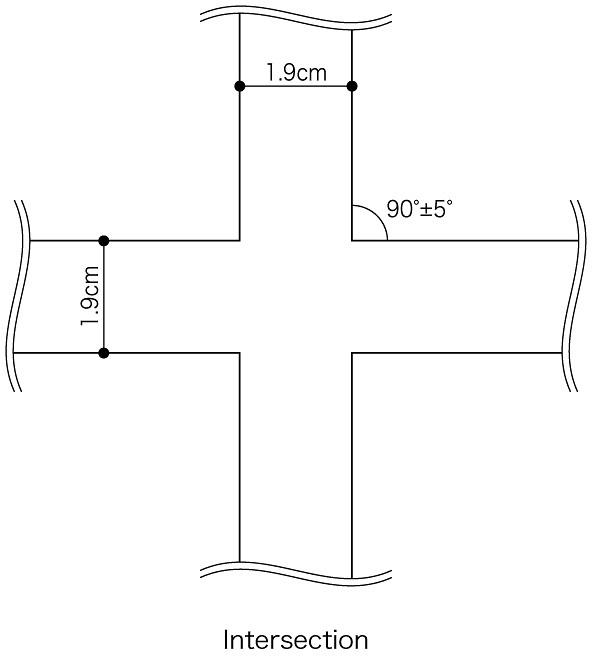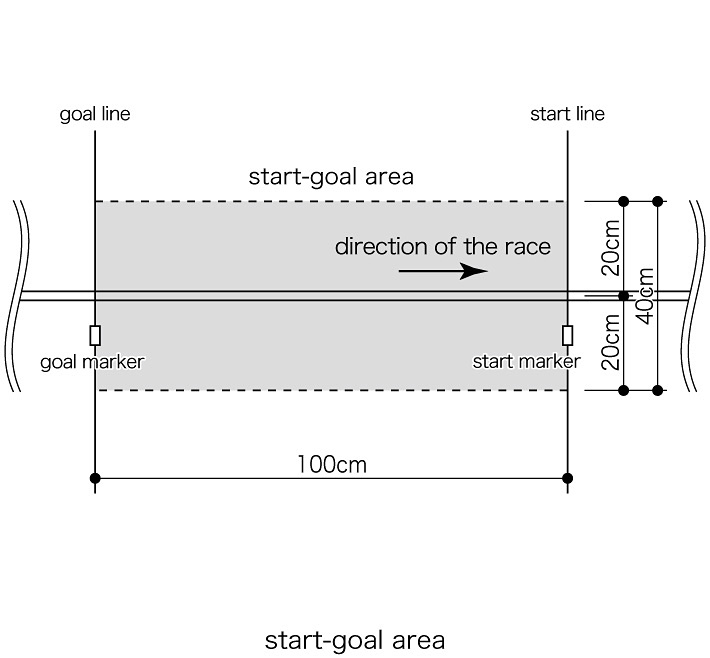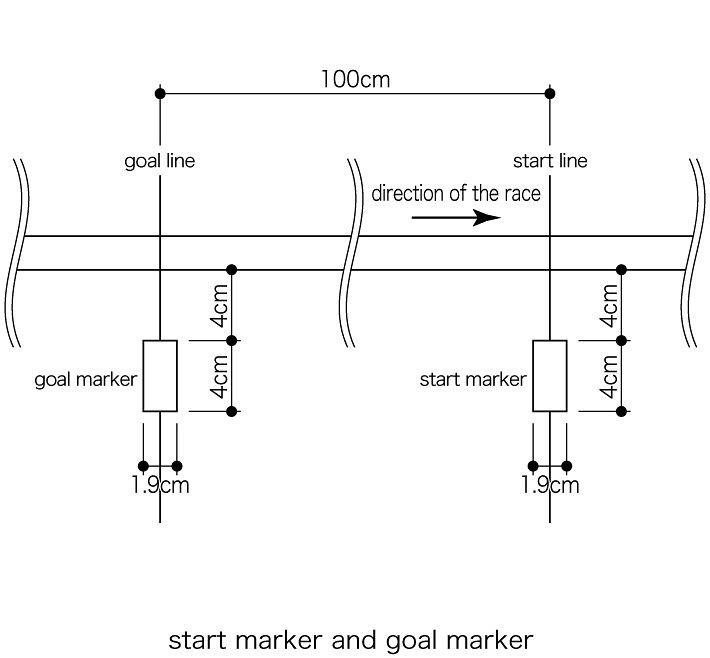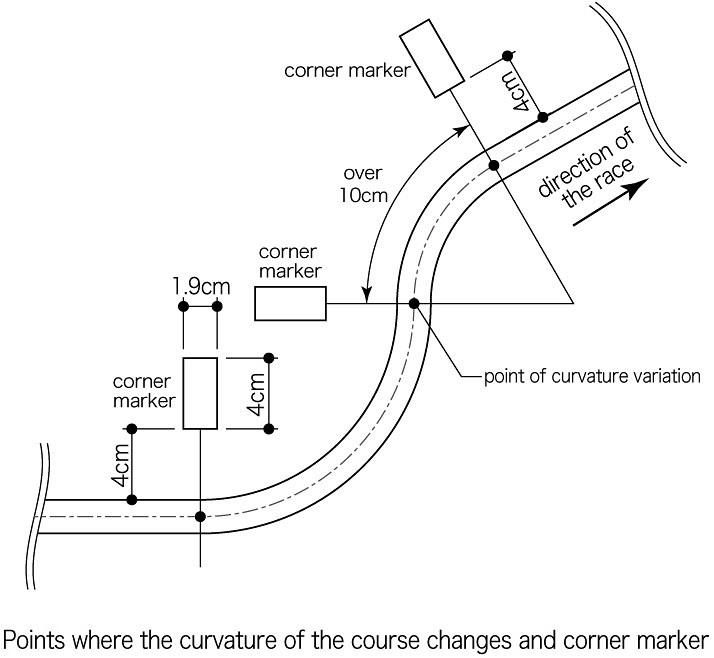Robotrace is a competition in which robots run in a specified oval course
to determinewhich is the fastest. Robots that enter robotrace races are
called "robotracers".
1. Rules for Robotracer
1-1. Robotracers must be self-sustained, and not
externally operated, by wire or by radio,except at the time of starting.
1-2. No addition, removal, replacement or change
shall be made to the hardware orsoftware
of a robotracer by the operator during a contest. It is however permissible to make
minor repairs.
1-3. A Robotracer shall not exceed 25 cm in
overall length, 25 cm in overall width and 20cm in
overall height.
1-4. A robotracer must not be
provided with a suction mechanism for increasing the ground contact force.
2. Rules for the Course
2-1. The running surface of the
course shall be black, and the course shall be a lap course indicated by a
white line of 1.9 cm in width. The total length of the line shall be no more than
60 m.
2-2. The line shall consist of a
combination of straight lines and arcs. The line may intersect itself.
2-3. The radius of curvature of
the arcs constituting the line shall be at least 10 cm. Also, the distance
between points where the curvature changes shall be at least 10 cm.
2-4. When the line intersects
itself, the angle of intersection shall be 90±5 degrees (See Fig. 1). The
parts of the line 25 cm before and after an intersection shall be straight.
2-5. The starting line and goal
line shall be located at straight parts of the lap course. The goal line shall
be located 1 m to the rear of the starting line. Starting and goal markers
shall be affixed to the specified locations on the starting line and the goal
line on the right side in the forward direction from the line (See Figs. 2
& 3).
2-6. The area extending 20 cm to
the left and right from the center point between the starting line and the goal
line is called the start-goal area. A starting gate and goal gate are placed on
the starting line and the goal line, respectively. These gates shall be 40 cm
in width and 25 cm in height on the inside.
2-7. The lines 25 cm before and after the
starting line and the goal line shall be straight.
2-8. A corner marker shall be
affixed to the specified position at the left seen in the forward direction, at
a point where the curvature of the line changes (See Fig. 4).
2-9. The circuit surface of a course shall be
level as a rule, however, portions inclinedat a
maximum of 5 degree may be included.
3. Provision for Races
3-1. A robotracer shall run
along a line such that the projection of the main body of therobotracer onto the floor surface is always on the line indicating the
course. Thecondition in which the main body of a robotracer completely
deviates from the linewhile it is running is deemed to constitute the robotracer
having gone off the course.
3-2. Each robotracer shall be provided with three
minutes, and may run three timeswithin
this time limit.
3-3. Robotracers shall start within the defined
start-goal area, and shall go in thespecified
direction. However, a series of runs may be made without interruption.
3-4. Robotracers must automatically come to a
stop within the start/goal area, andremain
there for at least two seconds after completing a run.
3-5. The shortest time of the time required for a
robotracer to run through each lap shall be recorded as the lap time for the
robotracer.
3-6. To determine the lap time of a robotracer,
the period from the time when the sensorat the starting line detects part of the body of the robotracer to the
time when thesensor at the goal line detects part of the body of the same
robotracer shall beclocked. However, no measured lap time shall be regarded
as a record unless theentire body of the robotracer passes through the
goal line.
3-7. A robotracer's run shall be deemed to end
when the robotracer stops for more than 2seconds
or goes off the course during its run.
3-8. After the course is disclosed, the operator
is not to feed any information on thecourse into the robotracer. In addition, the operator is not to revise
thecourse-related information or eliminate it partially by operating a
switch, etc.,during the contest.
3-9. The operator shall not touch a running
robotracer unless instructed to do so by thetournament committee chairperson, or unless intending to withdraw the robot
fromthe race and authorized to do so by the chairperson. The tournament
committeechairperson shall comply with a request to withdraw from the race
only when therobotracer becomes unable to run.
3-10. The lighting, temperature and humidity of
circuits shall be the same as those ofordinary indoor environments. No request to adjust the lighting shall be
compliedwith.
3-11. The tournament committee chairperson may
demand from operators such explanation concerning their robotracers as he / she deems necessary. The
chairperson may direct operators to give up racing, disqualify them and
take any other necessary measures at his/her discretion.
3-12. Prizes and evaluation
criteria will be set forth individually for each competition.
[Appendices]
(1) Loading a program or changing a ROM during a
tournament is not permitted. It is also
prohibited to connect a robotracer to any newly developed device or console
box, separate from the body, to give instructions related to the execution of
programs.
(2)The
contestant is permitted to remove dust and debris on the tires during a contest
using adhesive tape, etc.; however, no solvents and the like may be used for
the purpose of increasing friction.
(3) If a robotracer stops or
goes off the course after a starting operation has been performed but before
the robotracer reaches the starting line, the robotracer shall be deemed to
have run one lap.
(4) Even if a robotracer completes each run and
crosses the goal line, if it does not automatically
stop within the start/goal area, its run will be deemed invalid.
(5) Robotracers may not be
placed for adjustment or other purposes in any part of the course other than
the start-goal area except for during an official run.
(6) A course may have arcs with different curvatures
linked continuously.(See Fig.4)
(7) Differences in level of 1 mm or so may be
formed in courses.
(8) The sensors at the start line and the goal line shall be of the penetrating
infrared type, with the optical axis horizontal and positioned approx. 1cm above
the circuit surface.
(9) Proposals concerning the
grip of the road surface cannot be accepted.




[Important
Notice Concerning the Robotrace Contest]
1. About 30 robotracers among those that take part in the preliminary round
will go on to the final round based on rankings. However, robotracers that
completed the preliminary round, which in the opinion of the judge panel
exhibit outstanding technological excellence, may be selected to enter
the final round regardless of their preliminary rankings. Please note that,
in the case an individual or group enters more than one robotracer with
technological similarity in the preliminary round, only one robotracer
will be eligible to enter the final round. Also, the number of robotracers
an operator is permitted to operate will be limited to one (the creator
must operate his/her robotracer in principle).
2. Number of robotracer permitted to register
Only one robotracer by the same designer (operator) is permitted to be registered.
3. The surface of the course is
wooden, painted matte black. White vinyl tape is used to mark the lines. The
field will be made as level as possible. Complaints about these will not be
accepted.
4. In the Robotrace Contest, The
contestants will be prohibited from changing batteries during the contest.
5.
Lighting conditions and the use of flashes for photography in the arena.
The basic aim of the foundation in sponsoring this
competition is to encourage the development of robots that move in any given
conditions where humans conduct their life to the maximum extent possible,
rather than the development of robots that function only in controlled
environments.
(1)Lighting conditions
In line with the above spirit, the
competitions will be held under regular lighting as provided by the arena.
(2)Flash photography
As in the past, there will be an
announcement in the arena asking the audience to refrain from using flashes for
all competitions. Please take note, however, that some video and camera
equipment use infrared rays for their auto-focus function, and participants are
expected to come up with measures to successfully cope with infrared rays.
6.
Special Inspection concerning the Identity of Robotracers
All participating robotracers must be placed on a designated
stand for a set period of time after registration, so that a stricter
examination will be performed to check their identity and to determine their
uniqueness and similarities.
7. For the final round, the secretariat will keep the robots at a designated location before the game begins and until the game is over. Before his/her turn, each operator must receive his/her own robot at the designated area, have the robot complete its runs, and return it to the same place after runs are completed.
Evaluation Criteria for the Microclipper Contest
| Prize names |
Key factors in winning prizes |
| 1st Prize - 6th Prize |
Evaluations based on the shortest time required for
running from the starting point to the goal. |
| New Technology Prize |
Evaluation based on the willingness to incorporate new technical elements and concepts that effectively opened up technological horizons. |
| NAMCO BANDAI Prize |
An award given to the robot whose unique technical elements and concepts were the most exciting and which had the deepest impact on viewers. |
| Special prize |
Robotracers that has noticeable features other than the
evaluation items listed above. |
* The
foundation may limit the eligibility for awards to only one robot that achieves
the highest score among robots demonstrating technologically similar
characteristics created by a single group.
Prizes
1st Prize: Certificate of award, trophy & research grant of \100,000(JPY)
2nd Prize: Certificate of award, trophy & research grant of \50,000(JPY)
3rd Prize: Certificate of award, trophy & research grant of \30,000(JPY)
4th Prize: Certificate of award, trophy & research grant of \10,000(JPY)
5th Prize: Certificate of award, trophy & research grant of \10,000(JPY)
6th Prize: Certificate of award, trophy & research grant of \10,000(JPY)
New Technology Prize: Certificate of award & trophy
NAMCO BANDAI Prize: Certificate of
award
Special Prize:
Certificate of
award
High school students 1st Prize: Cup
* All award recipients will receive special
souvenirs. All contestants will receive a prize for participation.
|








